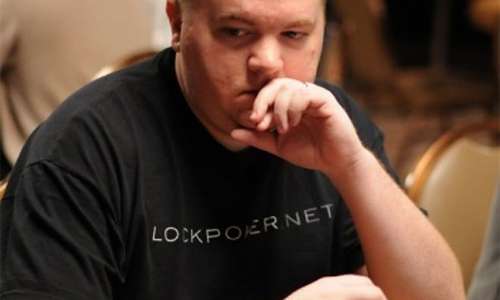PFA E-mail Exchange: Eric Lynch Quietly Departed Lock Poker Months Before Site’s Closure
A startling series of e-mails between former Lock Poker room manager Eric Lynch and the owner of the PokerFraudAlert discussion forum, Todd Witteles, includes several previously unpublicized disclosures about the internal operations of the failing, perhaps-fraudulent site. Among those revelations are that Lynch himself quietly terminated his role as Lock’s online poker room manager in August of 2014, but never allowed that information to be revealed publicly.
 The release of that nugget and several other insider tales came as Witteles, known by his “Dan Druff” handle throughout the poker world, published the full text of a lengthy e-mail exchange he and Lynch conducted in February of this year. Lynch, also known by his “Rizen” nickname, was one of Lock Poker’s most prominent pro-player endorsers throughout the majority of the site’s existence.
The release of that nugget and several other insider tales came as Witteles, known by his “Dan Druff” handle throughout the poker world, published the full text of a lengthy e-mail exchange he and Lynch conducted in February of this year. Lynch, also known by his “Rizen” nickname, was one of Lock Poker’s most prominent pro-player endorsers throughout the majority of the site’s existence.
Lynch acknowledged in a February 20th, 2015 e-mail to Witteles that self-preservation was one of his reasons for remaining publicly quiet on the general topic of Lock Poker. Lynch may have feared and may still yet fear legal repercussions for his ongoing role with Lock and its CEO, Jennifer Larson, a presumed fraudster who has been accused of using Lock player deposits for personal use, among other excesses.
Lock Poker drifted off to nothingness in May after having gone more than two years without paying any withdrawal requests of its players. The total stolen by Larson and other company principals may never be exactly determined, but general estimates place the amount of lost player deposits in the $15 million range. The vast majority of that total came from US-based players, as Lock was an unregulated offshore site that claimed to be licensed by the Curacao Gaming Commission, perhaps the phoniest of all such regulatory bodies. (Read this author’s “Commencing the Lock Poker Blame Game” for a long litany of the people and entities who may have had a role in allowing the Lock Poker fraud to continue as long as it diod.)
As for Lynch, the release of the e-mail exchange with Witteles paints a general picture of someone who waited far too long before severing ties with a site clearly in the process of going belly up. The problem that Lynch’s reputation faces is that had he shown a willingness to publicly disclose his departure from Lock Poker a year ago, it may have helped stop the trickle of deposits from poker novices that allowed Lock Poker to keep its virtual lights on well into 2015. Lynch instead fell back on the usual rationalizations of not being paid, still having hopes the company could be turned around, and so on.
Said Lynch, in a February e-mail that he still insisted be kept private by Witteles, “If you want to talk let’s talk. I will only do so with you, and for now only if we agree for all conversation to be private. Part of the reason no one has heard from me in this long is because I have some (I believe legitimate) concerns about consequences if I do. I’m not trying to be overly dramatic as I don’t think it’s life/death or anything like that, but I do believe going public would both potentially harm me as well as any potential help I could possibly do.”
Witteles chose to publish the exchange earlier today after Lynch failed to respond to inquiries made by Witteles in May, shortly after Lock’s operations were quietly terminated. Witteles took Lynch to task in that May missive, accusing Lynch of “Seboking,” Witteles’ pet term for wearing an increasingly heavy set of blinders in the face of steadily mounting evidence about a site’s true status — in this case, a back history of non-payment of Lock withdrawal requests that had already reached nearly two years by the time Lynch claims he left the site.
(The “Seboking” term refers to former UB.com spokesman Joe Sebok. The idealistic Sebok continued serving as the frontman for UB.com despite mounting evidence that the Cereus Network remained in control of the original batch of U. of Montana fratboys who ran the corrupt and cheat-riddled Absolute Poker site, and who then tried to hide their ownership behind a multi-national framework of bogus ownership entities.)
Despite numerous mea culpas by Lynch in the exchange between he and Witteles, a statement made by Witteles is true in fact: Lynch’s brief (but non-public) emergence to talk about Lock’s inner workings came only after a flurry of information about Larson and the workings of Lock was published by a couple of wronged former players after extensive digging, including a PFA poster with the handle “HipAintCheap.” (The author believes that the exchange between Lynch and Witteles as posted on the PFA website is also accurately reproduced.)
Though far too late to have any meaningful impact on the chances for Lock Poker’s victims to recover the funds, Lynch’s e-mails still offer some interesting nuggets about Lock and its CEO, Jen Larson. Among them:
- Lock was in serious development of a Russian-language Lock skin, purportedly in response to an expected investment from a Russian business group. The investment seems to have fallen part, and development of the Russian site was dropped;
- Lynch claimed that Lock Poker was itself the victim of theft by one crooked payment processor, to the tune of $800,000;
- Lynch claimed that he and Larson differed over the resolution of the “Girah” scandal at Lock, in which Portuguese player and Lock spokesman José Macedo was caught blatantly manipulating the outcome of a Lock leaderboard contest. Lynch wanted Macedo terminated, while claiming Larson overruled him to minimize the public furor and give Macedo an official “second chance”;
- As with most of the sites’ other pros — though none of them also had a management role with the company, as Lynch did — he was paid predominantly in Lock funds rather than in hard currency. At one point Larson offered a small but unspecified percentage of Lock to Lynch in exchange for the forgiveness of existing debt, as sure a sign as anything that the company had insubstantial liquid assets.
In perhaps the exchange’s most far-afield moment, Lynch claimed that long-time PokerStars fixture Lee Jones recommended to former PokerStars co-founder Isai Scheinberg that Lynch be his replacement as PokerStars online room manager in early 2007, when Jones himself moved over to a similar role at the Stars-sponsored European Poker Tour.
Wrote Lynch, “I had a long phone conversation with Isai about the role and I was super excited about it. When Lee first approached me about it saying he wanted to recommend me I told him I’d love to do it as long as it didn’t require relocation out of the US. My kids were young at the time and I didn’t want to take them away from our families so that was a deal killer for me. I was [led] to believe that wouldn’t be an issue but when it came down to it Isai said there was no way it could happen if I didn’t relocate and negotiations stopped there.”
The publication of the exchange by Witteles is likely to refuel interest in the Lock saga, as well as in the whereabouts of former Lock CEO Larson. Larson, whom some rumors have placed as living quietly in a small village in Italy, has never answered legally for the eight-figure disappearance of non-segregated player funds from her failed company.




















COMMENTS